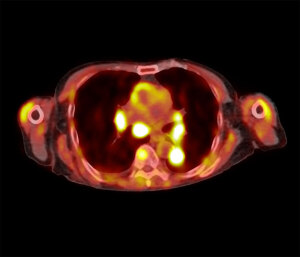by
John R. Fischer, Senior Reporter | July 11, 2022

Mirada Medical is integrating its RegEngine image registration algorithms into RefleXion's X1 treatment planning software for biology-guided radiotherapy. (Photo courtesy of RefleXion)
Mirada Medical is integrating its RegEngine image registration algorithms into the RefleXion X1 treatment planning software to account for anatomical changes during biology-guided radiotherapy procedures, as part of a nonexclusive, worldwide licensing agreement.
Designed for all stages of cancer, BgRT creates a unified motion management solution to treat one or more tumors with a PET radiotracer that binds to the cancer cells and indicates their location. This enables clinicians to deliver a tracked radiation dose directly.
But since radiotherapy changes patients' anatomy, adaptive care is essential for ensuring precise targeting, avoiding healthy tissues and lowering dose toxicity. Using an approach called Image Registration, RegEngine precisely registers images and image components to adapt treatment plans and calculate dose daily. “In challenging patients, such as those with metastatic disease where more than one tumor may be treated, adaptation requires robust tools such as Mirada’s sophisticated RegEngine software, so that clinicians can quickly assess patient anatomy, and in the future their biology, to implement changes to the treatment plan,” said Thorsten Melcher, chief business officer at RefleXion.



Ad Statistics
Times Displayed: 656
Times Visited: 5 Fast-moving cardiac structures have a big impact on imaging. Fujifilm’s SCENARIA View premium performance CT brings solutions to address motion in Coronary CTA while delivering unique dose saving and workflow increasing benefits.
Image registration is a complex series of algorithms that aligns images of the anatomy taken at different points in time and with different imaging modalities. It ensures precise targeting, which may lower toxicity for improved outcomes, as well as preserve healthy tissue.
RegEngine “warps” or “deforms” images pixel by pixel, in a process called deformable image registration, to account for changes. This helps in situations where the frames of reference of the images are similar, but biological processes, such as breathing or digestion, and changes in positioning during procedures alter anatomy.
“RefleXion’s biology-guided radiotherapy has the potential to offer a new treatment option for patients with all stages of cancer, and we are excited and proud to have RegEngine selected as a key component of the treatment planning process in this exciting novel technology,” said Mirada CEO Jon DeVries.

